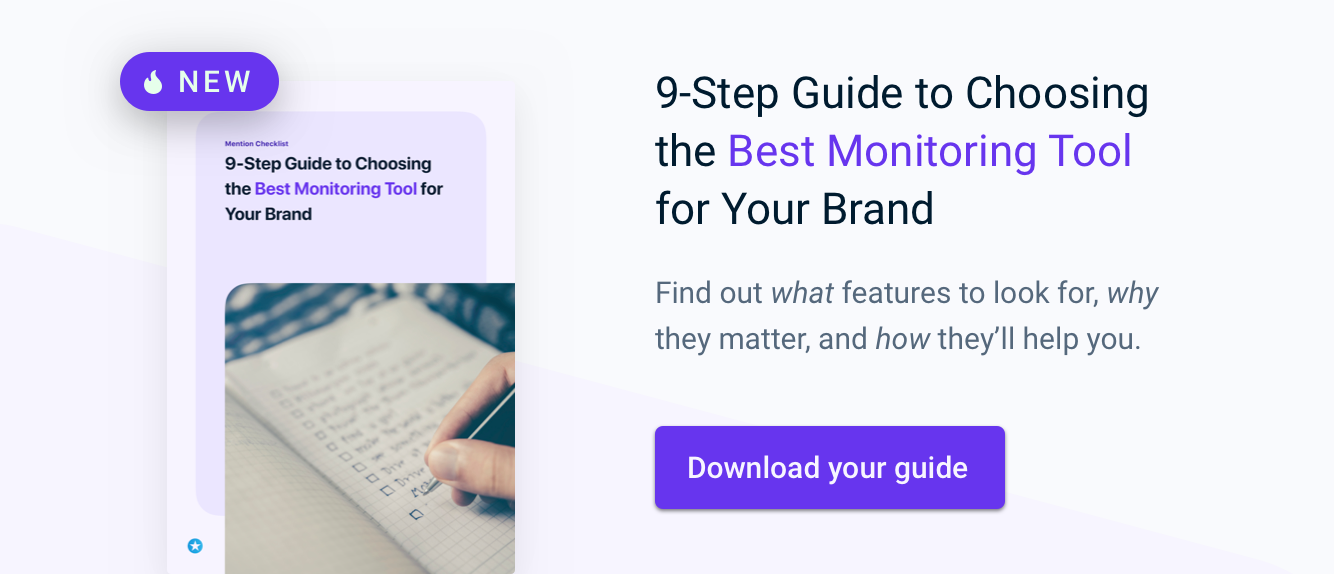From social media, to online advertising campaigns, to collaborations with influencers – you’ve been working hard to create buzz online around your brand and its products. How do you know if it’s working?

Most marketers know by now that measuring brand awareness begins with monitoring what people are saying about your brand. This involves tracking the keywords used in the conversations relating to your brand.
Keywords can range from your company name, products, or terms related to your industry and competitors. In this blog post, we’ll explore the essential types of keywords you should be tracking for brand monitoring and why.
Tracking the right keywords is the key to effective brand monitoring

Monitoring the right keywords can help you discover a lot about your brand. It can give you a better understanding of your customers and community by showing you:
- Which industry keywords or trends people associate with your brand
- How people feel about your company, product, or service
- The keywords they use when talking about your competitors
All of this can help you improve your products and services, as well as identify opportunities to engage with your audience.
Brand monitoring is more than social media monitoring
Many of us are just tracking our company name on social media, such as our Twitter handles – but you shouldn’t stop there. Brand monitoring extends beyond social media, because your company and products exists beyond social media.

Source: PC World
People talk about your brand on blogs, forums, and even on review sites like Yelp or Google Reviews. So no matter what kind of tool you use to monitor keywords related to your brand, you need to track conversations everywhere your customers are.

Source: PC World
But which keywords should you track? While marketers know they should be tracking keywords, many aren’t sure of the types they should be monitoring. Here are 5 types every brand should be tracking:
1. Company and brand-related keywords
Tracking your company name is a no-brainer. But to go one step further, you should include everything that you think people would mention alongside your brand name such as:
Misspellings and variations
We all rely on Google and spell-checkers more than we’d like to admit. For this reason, you should include common misspellings and variations of your brand name.

Source: Mention
Your brand name may happen to be a normal word or a generic name such as ‘mac’ – which could be Macintosh computers from Apple or ‘MAC’, a cosmetic brand. In this case you’ll want to distinguish it from other brands by including keywords that are usually associated with your brand. By tracking variations of your brand name, you’ll be able to pick up conversations that you may have otherwise missed.
Branded keywords or hashtags

Source: Stalkture.com
This could be your brand’s slogan, tagline or hashtag, such as ‘Just Do It’ or ‘I’m Lovin’ It’. It’s a good idea to track these as they may be mentioned instead of your brand name.
Event hashtags
Events may be a huge part of your brand, such as HubSpot’s annual #Inbound conference, or Apple’s #WWDC. For this reason, you’ll definitely want to track what people are saying before, during and post-event.
Your CEO
Monitoring the mentions of the executive leaders of your company is important for a lot of reasons, especially for reputation management. You’ll want to keep a close eye on any negative mentions of your C-suites and have a process in place to respond to them.
2. Product or service related keywords

Source: idonethis.com
If you’re a large company with many different offerings like Amazon – or an agency that provides multiple services – you’ll want track specific products or services such as Amazon Prime and Amazon Kindle in addition to your branded keywords.
Product hashtags
Sometimes, people could be mentioning your product as a hashtag on Twitter or Instagram such as #macbook or #iphone, instead of your brand.
3. Campaign-related keywords
It’s important to follow campaign related keywords and hashtags closely, whether you’re launching an influencer collaboration on Instagram or a special promotion on a micro-site.
As campaign keywords may only be active for a short period of time, you’ll want to gauge what people are saying at the beginning so you can react quickly. In the case of Pepsi’s disastrous ad with Kendall Jenner (above), monitoring the campaign mentions just after the video published could have prompted them to pull the plug immediately instead of after receiving a lot of backlash.
4. Competitor-related keywords

Source: Mention
Name and products
Monitoring the name and products of your main competitors can help you gain valuable insights into the market. For example, you’ll be able to learn about their latest product and campaign releases, compare your key metrics against theirs (including share of voice), and adopt the strategies that are working for them.
You can also track negative mentions of your competitors and then reach out to their unhappy customers to try to convert them.

Source: Xen Media Marketing
Campaign and branded hashtags
Checking your mentions of your competitors regularly will let you stay up to date with any new campaigns they launch. Once you’re aware of a new campaign that they’re running, you should follow it closely to see how it’s performing.
5. Industry keywords
Common terms, hashtags and trends
You’ve just looked at what people are saying about your key competitors, and now you’ll want to expand that to the rest of your industry. Monitoring industry keywords is a great way to identify new trends and opportunities.
Create marketing campaigns or content based on new and relevant trending keywords in your industry. This can help drive some of that related traffic to your website. Here at Mention we monitor the top technology events, and one of the biggest ones this year was clearly the release of the iPhone 8. So we tracked many of the related keywords such as #AppleEvent, #iphoneX and #iphone8, and #WWDC. The result? It was our highest-performing blog post of the month.

Source: Mention Blog
Influencers
Influencer marketing has become one of the most popular marketing strategies around. According to a recent poll, it has now outranked organic search and email marketing as the most cost-effective and fastest-growing online acquisition channel.
Influencers include both brand ambassadors as well as industry or subject experts. You can identify both types in your industry by using a tool that lets you filter your industry search results by influencer score.
For example, if I wanted to find influencers about the topic ‘brand monitoring’, I would enter that as my keyword and set my filters to show me results only from people above a certain influencer score.

Source: Mention
Let’s wrap up
While we’ve showed you five types of keywords to track, there are endless possibilities of what you can monitor for your brand. So before you start, set your objectives and base your monitoring strategy around them.
Ready to start monitoring? Check out our guide to help you choose the best brand monitoring tool for your business.
Subscribe to Marketing + Monitoring Weekly
Get hot blog posts, insanely useful resources, and funny gifs every Friday.

